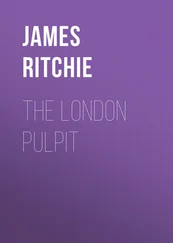James Ritchie - Here and There in London
Здесь есть возможность читать онлайн «James Ritchie - Here and There in London» — ознакомительный отрывок электронной книги совершенно бесплатно, а после прочтения отрывка купить полную версию. В некоторых случаях можно слушать аудио, скачать через торрент в формате fb2 и присутствует краткое содержание. Жанр: foreign_prose, Путешествия и география, на английском языке. Описание произведения, (предисловие) а так же отзывы посетителей доступны на портале библиотеки ЛибКат.
- Название:Here and There in London
- Автор:
- Жанр:
- Год:неизвестен
- ISBN:нет данных
- Рейтинг книги:4 / 5. Голосов: 1
-
Избранное:Добавить в избранное
- Отзывы:
-
Ваша оценка:
- 80
- 1
- 2
- 3
- 4
- 5
Here and There in London: краткое содержание, описание и аннотация
Предлагаем к чтению аннотацию, описание, краткое содержание или предисловие (зависит от того, что написал сам автор книги «Here and There in London»). Если вы не нашли необходимую информацию о книге — напишите в комментариях, мы постараемся отыскать её.
Here and There in London — читать онлайн ознакомительный отрывок
Ниже представлен текст книги, разбитый по страницам. Система сохранения места последней прочитанной страницы, позволяет с удобством читать онлайн бесплатно книгу «Here and There in London», без необходимости каждый раз заново искать на чём Вы остановились. Поставьте закладку, и сможете в любой момент перейти на страницу, на которой закончили чтение.
Интервал:
Закладка:
A NIGHT WITH THE LORDS
Amongst the sights of London surely may be reckoned the Chamber of Peers – fallen from its high estate, but still existing as a potent institution in this self-governing country and democratic age. Of course it is usual to sneer at the peers – we all do so; and yet we would move heaven and earth to be seen walking arm in arm with a peer, no matter how old or vicious he be, on the sunny side of Pall Mall. We all say the peers must give way to the Commons; and yet we all know that half the latter are returned by the former, and that you can no more succeed in contesting a county against its lords and landlords, than you can hope to fly in the air, or to walk on the sea. Hear a pot-house orator on the House of Peers, you would think it the most indefensible establishment imaginable. But is it so? Ask Exeter Hall; that truly British institution is in raptures with the whole British peerage. A lord at a Bible meeting – a lord stammering a few unconnected common-places about the propagation of Christianity in foreign parts, or the conversion of the Jews – a lord denouncing the Pope, or anticipating the coming of the millennium – is a sight dear to the British public. Sneer at the Lords as you will, expatiate on the manifest absurdity of supposing that they are wiser and better than other people, say, what every one knows and thinks, that you cannot transmit brains as you can the family spoons, and that therefore the idea involved in hereditary peerage is a lie; nevertheless, the House of Peers still continues a great fact. And it is a gorgeous fact as well. The apartments of the Commons are poor and mean compared with the chamber, all resplendent with crimson and gold, where the Lords meet. As you enter the central hall in the new Houses of Parliament, the passage to the right leads you to the Lords. We will suppose you have got an order – any peer can give you one; and as the House commences its sitting at five, and there is plenty of room in the gallery, you may take your time almost as freely as the celebrated Miss Lucy Long herself. Passing the lobby, you soon find your way into the house, the magnificent adorning of which will be sure to excite your utmost admiration. Some may say it is too gaudy, everything pertaining to the chamber is so richly decorated; but it is very fine, and when Parliament is opened by Majesty in person, and the house is crowded with all the great men of our land, and the galleries blaze with beauty and diamonds, the effect must be, as it has always been described, imposing in the extreme. On ordinary evenings, however, nothing of this splendour is visible; the house has a deserted air; an assembly of a dozen or twenty is a very fair muster; a debate of a couple of hours is generally considered as unusually exciting and fierce. The best description of a debate in the Lords we have ever read is that by Disraeli, in the “Young Duke.” We quote the passage: – “The Duke of St. James took the oaths and his seat. He was introduced by Lord Pompey. He heard a debate. We laugh at such a thing, especially in the Upper House; but on the whole the affair is imposing, especially if we take a part in it. Lord Exchamberlain thought the nation going on wrong, and he made a speech full of currency and constitution. Baron Deprivey Seal seconded him with great effect – brief, but bitter, satirical, and sore. The Earl of Quarterday answered these, full of confidence in the nation and in himself. When the debate was getting heavy, Lord Snap jumped up to give them something light. The Lords do not encourage wit, and so are obliged to put up with pertness. But Viscount Memoir was very statesmanlike, and spouted a sort of universal history. Then there was Lord Ego, who vindicated his character when nobody knew he had one, and explained his motives because his auditors could not understand his acts. Then there was a maiden speech, so inaudible that it was doubted after all whether the young orator really did lose his virginity. In the end, up started the Premier, who, having nothing to say, was manly, and candid, and liberal; gave credit to his adversaries and took credit to himself, and then the motion was withdrawn. While all this was going on, some made a note, some made a bet, some consulted a book, some their ease, some yawned, a few slept. Yet, on the whole, there was an air about the assembly which can be witnessed in no other in Europe. Even the most indifferent looked as if he would come forward if the occasion should demand him, and the most imbecile as if he could serve his country if it required him.”
Читать дальшеИнтервал:
Закладка:
Похожие книги на «Here and There in London»
Представляем Вашему вниманию похожие книги на «Here and There in London» списком для выбора. Мы отобрали схожую по названию и смыслу литературу в надежде предоставить читателям больше вариантов отыскать новые, интересные, ещё непрочитанные произведения.
Обсуждение, отзывы о книге «Here and There in London» и просто собственные мнения читателей. Оставьте ваши комментарии, напишите, что Вы думаете о произведении, его смысле или главных героях. Укажите что конкретно понравилось, а что нет, и почему Вы так считаете.












